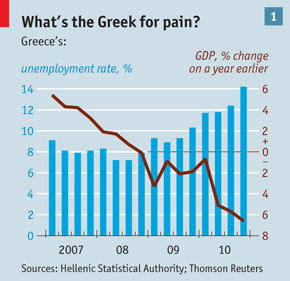“Early last year, many people on both sides of the Atlantic seized on the idea that less is more — that cutting spending would actually help, not hinder, recovery. There was a paper by Alesina and Ardagna that seemed to provide evidence to that effect, and nothing succeeds like telling people what they want to hear.”Krugman, almost gleefully, reports on the current state of affairs.
“Since then, the whole intellectual edifice has collapsed. The Alesina et al methodology turns out to be deeply flawed, which should have been obvious from the start (and was, to some of us.) The alleged cases of expansionary austerity have, without exception, turned out to be bad examples, either involving cuts when the economy was booming or situations in which sharp interest rate declines and/or currency depreciations were the actual sources of expansion.”
“But by then expansionary austerity was the official doctrine of the Conservatives in Britain (and also the ECB) and of the GOP here.”
“Austerity advocates predicted that spending cuts would bring quick dividends in the form of rising confidence, and that there would be few, if any, adverse effects on growth and jobs; but they were wrong.”Even the economically conservative magazine, The Economist, is beginning to have doubts. They produced an article with the tag line: The international plan to rescue Greece is instead starting to paralyze it.
“Portugal's government has just fallen in a dispute over austerity proposals. Irish bond yields have topped 10 percent for the first time. And the British government has just marked its economic forecast down and its deficit forecast up.”
“....the interest rate on Irish debt has doubled; Ireland's unemployment rate now stands at 13.5 percent.”
“As Portugal this week joined Ireland and Greece in requesting international rescue funds, it would have drawn little comfort from the example in the eastern Mediterranean. The mood in Greece is one of deepening pessimism. A plan drawn up last May to sort out the country’s public finances risks trapping the economy instead.”
“But the real source of gloom is the shorter-term impact of austerity. A year ago the plan forecast that GDP would shrink by 4% in 2010 and 2.5% in 2011. Instead it fell by 4.5% last year and IOBE predicts it will decline by 3.2% in 2011. The unemployment rate has risen from 9% in mid-2009 to 14.2% in the last quarter of 2010, and is expected to average 15.5% this year.”
“The fiscal setbacks have made the markets even more wary of Greek debt. Ten-year government-bond yields have climbed to almost 13%. The credit-rating agencies have recently downgraded Greek sovereign debt still further, from junk to junkier.”
Greece is making some much needed changes in their government and in their economy, but inflicting pain, even necessary pain, in the face of a severe recession may be more than the economy—and the government—can bear.
“The economy is stuck in a vicious circle. If it stays weak, that will undermine the government’s ability to achieve additional fiscal retrenchment; that in turn will cause further loss of confidence on the part of the markets, which will continue to lock the banks out of funding sources. Is there a way out of the trap?”Unfortunately, they were not able to provide a very convincing answer to their own question.
Europe seems to have been swept up into what might best be described as an economic fad. Let us hope they do not do too much damage to themselves and to the rest of us while they pursue their dubious experiment.



No comments:
Post a Comment